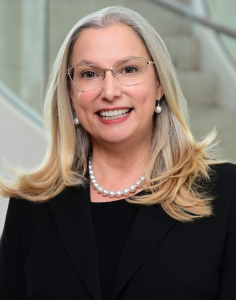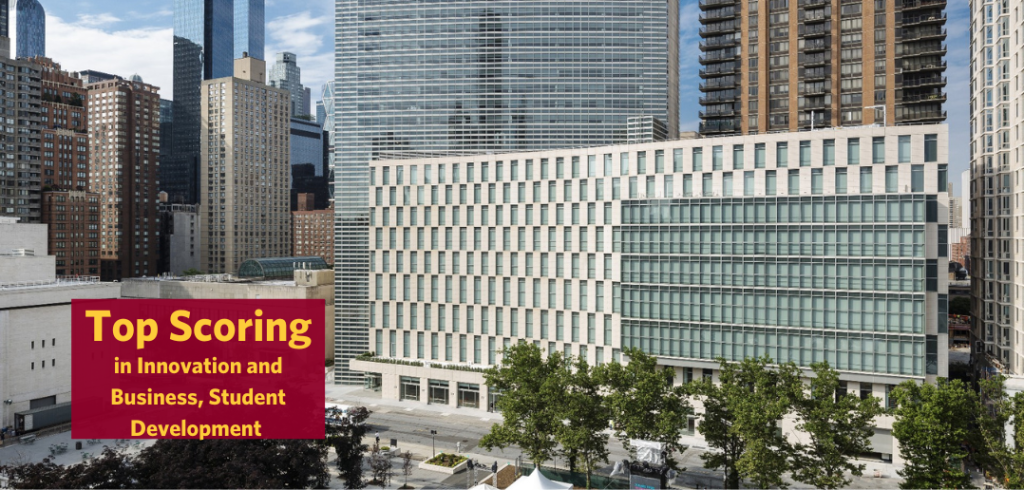On Jan. 27, Bloomberg Law recognized Fordham Law School’s Entrepreneurial Law Program and Clinic and Peer Mentoring and Leadership Program as two of the most innovative programs in the country.
Bloomberg Law’s inaugural Law School Innovation Program recognizes law schools that have created and implemented programs that are leading innovation in legal education. The recognized programs advance new methodologies and approaches to student instruction, legal technology implementation and usage, experiential learning, and other facets of legal education.
One of the Best in “Innovation and Business”
Fordham Law’s Entrepreneurial Law Program and Clinic was named as one of the six top-scoring programs in the Innovation and Business category.

Under the supervision of Clinic Director Bernice Grant, the Entrepreneurial Law Clinic* (ELC) provides free transactional legal services to startups in New York, helping turn entrepreneurs’ ideas into flourishing enterprises. ELC’s clients come from two main groups: entrepreneurs whose businesses have an overall positive social impact and clients who come from low-income backgrounds and who otherwise would not be able to afford an attorney. Since 2017, the ELC has helped these entrepreneurs achieve ambitious business goals, build a talented workforce, and protect their budding brands.
Grant teaches students how to provide transactional legal services to entrepreneurs, using an integrated law and business perspective. Students in the clinic directly advise entrepreneurs on a wide range of legal issues, including business entity formation; compensation matters; intellectual property protection; and employment, financing, shareholder, operating, licensing, and customer agreements.
The ELC is part of a larger entrepreneurial law program at Fordham Law that combines a foundational curriculum in law and entrepreneurship with opportunities for students to work directly with early-stage startup companies and social enterprises. The clinic also collaborates with the Fordham Foundry—Fordham University’s hub for innovation and entrepreneurship—to support student entrepreneurs. This summer, Grant plans to teach a Comparative Entrepreneurial Law course in Fordham’s Ghana Summer Law Program.
The Entrepreneurial Law Clinic at Fordham Law from Fordham Law School on Vimeo.
The ELC—whose theme is “Transactional Lawyering with Social Impact”—has contributed to social justice progress in a number of ways through its work. For example, it represented a formerly incarcerated entrepreneur who created a startup that hired over 100 other formerly incarcerated people, resulting in a zero-percent recidivism rate. To expand the ELC’s reach and highlight its focus on technology, Grant created a legal podcast, Startup LAWnchpad*, in 2018.
“We are delighted to be recognized by Bloomberg Law for developing an innovative program at the intersection of law and business,” said Grant. “As the legal industry and business world continue to evolve, we seek to incorporate emerging technologies and legal issues into our curriculum so our students will be prepared to meet client demands of the future. Whether that involves advising a tech startup on novel legal issues, preparing a podcast episode on legal issues for entrepreneurs, or collaborating with Fordham’s Gabelli School of Business, we always try to have our students stay ahead of the curve.”
Leading the Way in “Innovation and Student Development”
Fordham Law’s Peer Mentoring & Leadership Program was also named a top-scoring program in the Innovation and Student Development category.
Launched in 2018, the Peer Mentorship Program** is a community-building initiative and support system for upper-level students at Fordham Law. A signature initiative of the Law School’s Professionalism Program, it is designed to meet the needs of students starting their second year of law school, which presents students with unique challenges compared to the first year. Students work in teams to demystify challenges, solve problems, and access services and resources at the law school. The Peer Mentorship Program collaborates with the student affinity groups to promote inclusion and belonging at the Law School, fostering meaningful, respectful, and sustained cross-cultural relationships.

The Peer Mentorship Program’s single defining feature is an academic course for mentors, which was developed and taught by Professor Linda Sugin. The program has grown so that multiple sections of the course are now offered every year and Assistant Dean Jordana Confino and adjunct teachers teach alongside Sugin. The course builds leadership skills by focusing on effective listening, empathy, handling stress, learning from failure, working across cultures, emotional intelligence, giving and receiving feedback, developing character strengths, and self-care. Through readings, exercises and reflections, the course supports mentors in a collaborative community.
“The core of the program is simple: law students can support each other and achieve professional and personal growth if law schools provide institutional support,” said Sugin. “All the mentoring and leadership skills developed in the program are essential for lawyers. Lawyers need to develop self-awareness, work cross-culturally, handle challenges and setbacks with resilience and equanimity, and care for their own well-being. This program helps students develop professional and personal skills that they will take with them wherever they go.”
*The Entrepreneurial Law Clinic and Startup LAWnchpad are made possible by the generous support of the Nasdaq Educational Foundation and Fordham’s Entrepreneurial Law Advisory Council.
**The Peer Mentorship Program is supported by Rich Ross ’86.

